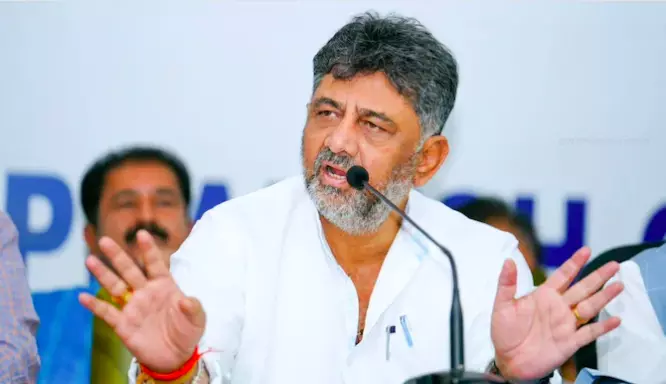The Karnataka political landscape was jolted after an FIR was filed against the handler of the JD(S) party’s official X (formerly Twitter) account for spreading a false claim about Deputy Chief Minister and Karnataka Congress President D.K. Shivakumar’s expulsion from the Congress party. The post, which quickly spread across social media platforms, triggered confusion and anger among supporters before being declared fake. Police booked the case under sections related to misinformation and defamation, stressing that the act had the potential to disturb public order and damage reputations in the midst of political rivalry.
Congress leaders reacted strongly, accusing the JD(S) of orchestrating a deliberate smear campaign to malign one of their most influential leaders. Protests broke out in parts of Bengaluru, where Congress workers demanded swift and strict legal action against those responsible. While JD(S) distanced itself from the controversial post, insisting it was not a directive from senior leadership, the damage had already been done. Political analysts warned that such episodes highlight the deepening use of disinformation as a weapon, especially when the state is approaching crucial electoral battles. The event has also deepened the bitterness between the two rival parties, adding fuel to Karnataka’s already volatile political scene.
This case has sparked a wider debate about the responsibility of political parties in managing their digital communications. Experts argue that political outfits often fail to regulate their social media wings, which sometimes post unchecked or misleading content in the race for online dominance. Authorities have made it clear that such activities cannot go unchecked and will attract legal consequences. With police preparing to summon the JD(S) social media team for questioning, the spotlight is now on accountability and the larger battle against misinformation that threatens the democratic process.

Political Reactions and Rising Tensions
The Congress has turned this episode into a rallying point, portraying Shivakumar as a leader unfairly targeted by rivals. Leaders within the party demanded that JD(S) be held accountable not just through its handler but as an organization. The JD(S), on the other hand, accused the Congress of exaggerating the issue for political mileage. This blame game has intensified the already fraught political environment in Karnataka, where every move is closely scrutinized by voters. Supporters on both sides continue to exchange heated arguments on social media, amplifying the controversy further.
Meanwhile, police officials have assured that the investigation will be impartial and thorough. The JD(S) social media team is expected to be questioned to ascertain whether the post was an individual’s error or part of a larger strategy. Experts believe this case could become a precedent, serving as a warning to political parties across India about the risks of irresponsible social media usage. As Karnataka prepares for its electoral battles, the incident underscores how technology is shaping politics, sometimes in dangerously misleading ways.


The filing of the FIR has not only stirred controversy but also brought to the forefront the role of misinformation in modern politics. Social media platforms, which were initially meant to engage citizens and disseminate information quickly, have now become fertile grounds for spreading falsehoods. The case involving the JD(S) account has highlighted how a single misleading post can ripple through the political ecosystem, creating confusion among the public. Analysts stress that such digital manipulation risks not only misleading voters but also destabilizing public trust in democratic institutions, especially during times of heightened political rivalry.
Observers point out that the incident has created significant embarrassment for the JD(S), a party that has traditionally positioned itself as a regional power with strong grassroots appeal. Being accused of orchestrating a deliberate disinformation campaign against a prominent leader like D.K. Shivakumar undermines its credibility. Many believe this could weaken the party’s position further, especially among undecided voters who value honesty and accountability. On the other hand, Congress has seized the opportunity to portray itself as the victim of smear tactics, bolstering Shivakumar’s image as a strong and unfairly targeted leader.
The police’s swift registration of the FIR sends a message that misinformation campaigns will not be tolerated, regardless of political affiliations. Legal experts argue that this case may set a precedent for future political controversies involving social media misuse. If the accused is found guilty, the punishment could range from fines to imprisonment, depending on the seriousness of the charges. Such actions could act as a deterrent, forcing political parties to rethink how they manage their digital communication teams and the content they allow to circulate publicly.
Meanwhile, political analysts have observed that such controversies often overshadow more pressing issues affecting the state. With Karnataka facing challenges like poor infrastructure, rising unemployment, and farmer distress, political discourse being consumed by a single misleading post is seen as both unfortunate and indicative of today’s political culture. Instead of discussing governance and developmental policies, leaders are drawn into heated debates over misinformation, taking away valuable time and attention from the real concerns of citizens. This pattern, experts say, is becoming increasingly common in Indian politics.
The episode has also intensified debates on the role of tech companies in monitoring political content. Social media giants like X (formerly Twitter) have often been accused of failing to regulate political misinformation adequately, especially during sensitive times. Critics argue that these platforms must step up with stronger policies, better fact-checking tools, and faster responses to false content. Without such measures, political parties may continue to exploit these digital spaces unchecked. Civil society groups are also pushing for a collaborative approach involving government, tech companies, and watchdogs to counter fake news effectively.
Congress has strategically used this incident to rally its workers and strengthen the narrative that its leaders are unfairly maligned by opposition parties. Party spokespersons have accused the JD(S) of stooping to unethical practices, pointing out that such tactics reveal desperation in the opposition camp. For Shivakumar personally, the controversy has turned into an opportunity to consolidate his base, especially among loyalists who see him as a victim of targeted misinformation. This could potentially enhance his stature within the party, positioning him as a strong contender for future leadership roles in state politics.
The JD(S), however, has tried to distance itself from the post, claiming that the error was committed by an individual handler without approval from party leadership. Yet, political opponents remain unconvinced, arguing that a party of its size cannot afford to let its digital operations function without supervision. If the investigation reveals organizational lapses, JD(S) could face long-term reputational damage. In an era where online engagement is directly linked to voter influence, such controversies can prove costly, especially during election campaigns when public perception plays a crucial role in shaping outcomes.
The Larger Digital Battle in Politics
The controversy reflects the increasing importance of digital platforms in political battles. With social media emerging as the frontline for propaganda wars, misinformation has become a recurring challenge for authorities and the electorate alike. Experts warn that unless stricter regulations and internal party mechanisms are adopted, such incidents will recur, undermining public trust. For now, the FIR has put the JD(S) in a defensive position while strengthening Congress’s narrative of victimhood. The incident could shape voter perception in the coming months, proving once again that political battles today are fought as much online as on the ground.

Citizens too have expressed mixed reactions. While some see the FIR as a necessary step to uphold accountability, others worry that political parties may misuse such legal provisions to target rival groups unfairly. Social media users remain divided, with hashtags supporting both Congress and JD(S) trending simultaneously. This polarization reflects the larger reality of Indian politics, where digital platforms are increasingly acting as battlefields for narrative control. Experts suggest that greater awareness among citizens about identifying misinformation is equally important, as laws alone cannot solve the problem completely.
The Karnataka government has also indicated that it will continue to take strong measures against digital misinformation, regardless of which party is involved. Officials stressed that such incidents have the potential to incite unrest, especially when linked to influential leaders. The case has further fueled discussions about introducing stricter laws regulating online political activity in India. While free speech remains a cornerstone of democracy, lawmakers argue that deliberate disinformation designed to harm individuals or institutions cannot be protected under this banner. Striking the balance between freedom and regulation remains a pressing challenge.
Ultimately, the controversy underscores the growing intersection between politics, technology, and public perception. With elections looming on the horizon, incidents like this may become more frequent as parties race to dominate online narratives. For voters, this means navigating a complex digital environment where fact and fiction are often blurred. The FIR against the JD(S) account handler serves as a warning shot, reminding all stakeholders that accountability in the digital age cannot be ignored. As the investigation progresses, its outcome could shape not only Karnataka’s political dynamics but also national discussions on digital ethics in politics.
Follow: Karnataka Government
Also read: Home | Channel 6 Network – Latest News, Breaking Updates: Politics, Business, Tech & More

